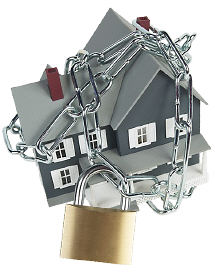Secured Loans

What are "secured loans"?
When loans are "secured" it means that you have offered some property of yours to the lender as a guarantee, so that the lender is taking less risk. If you don't pay back secured loans as agreed, the lender can take your property from you.
This means the lender takes less risk. If you pay back what you owe, the lender gets income from the interest they have charged you. If you don't pay back what you owe, they take your property and sell it. Either way, they profit, so secured loans are a way that the lender can reduce their risk.
You take more risk, because you may lose your property (the one offered as "security") if you fail to keep up the repayments on any secured loans you have.
What is "security"?
Security refers to your property.
It may be your home, in which case you have to own the proprety, not rent it. It doesn't usually matter whether your home is mortgaged or owned outright.
The security may also be something else you own. This is most common in the case of Hire Purchase, which one of a number of types of secured loans. For example, if you buy a car on HP, the car acts as security; if you fail to keep up the repayments, the car can be repossessed.
Why use secured loans?
Secured loans may be easier to obtain than unsecured ones, especially if your credit rating is poor or you need to consolidate some existing debts. They are easier to get because the lender is taking less risk.
Secured loans may be cheaper to pay back. The interest rate, set by the lender, often reflects the degree of risk involved: more risk leads to higher interest rates, reduced risk leads to lower interest rates.
If you are looking to borrow larger sums of money (into the tens of thousands of pounds) then secured loans may be your only option, because the lender won't be willing to take any risk.
What can go wrong?
The main problem that can occur is if you can't keep making the regular repayments, in which case you might lose your home/property. If this happens, there is a legal process to follow (eg: the lender has to give you notice of repossession, and opportunity to repay the debt). There may be complications if someone else has part ownership of the house, or just lives in it but has habitation rights. To avoid these complications the lender may have asked anyone who may have such rights to sign a waiver, giving them full rights of repossession.
Can I avoid repossession?
Before you commit to taking out a loan, produce a budget to make sure that you can afford the repayments. If you don't know how to produce a budget then get someone to help you. There are various charities that can help in budget planning (eg: Credit Action) if you don't know anyone personally who can help.
Take out insurance against unforeseen events, such as accident, illness or redundancy. These are usually offered at the time of the loan by the lender, and the premiums form part of the monthly repayments, but these policies can be expensive. It is worth getting a quote from an independent financial advisor, either for insurance to cover your secured loans, or for more general insurance that covers all eventualties. Note: if you are made redundant or become ill, your repayments are not the only bills you will have to meet, so it is worth investigating insurances, such as Permanent Health, Critical Illness, and Life cover, that will also cover all your other financial commitments.
If the worst does happen, and you can't afford to make the repayments, don't ignore the problem. Talk to the lender and try to negotiate a rescheduling of the loan to a level you can afford, or temporary reduced repayments until you are able to start making full repayments again. For example, you could offer to meet the interest charges but temporarily suspend the repayment of the loan. The attitude of banks and lenders will vary greatly to ideas such as this, but if you can show you will pay something, and have an alternative plan for paying off the debt in the long term, you are much more likely to get a positive response. If you find this planning and negotiation difficult, a debt counsellor may be able to help you with both.
See also our article on unsecured loans.
©2013 Team Technology. Privacy policy and cookies.

